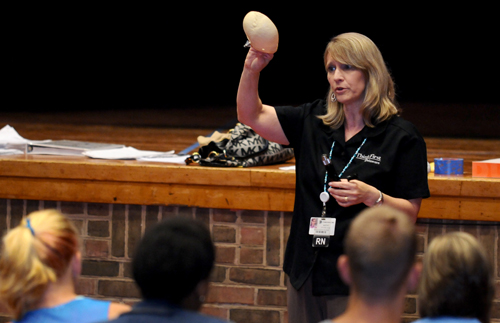Injury prevention programs help to build a safer community


With more people traveling and engaging in outdoor activities, the already fast-paced nature of Christiana Hospital’s Level One Trauma Center grows only more intense during the summer.
Christiana Hospital features the only Level I trauma center for both adults and children in Delaware, and the only one of its kind between Baltimore and Philadelphia. Recently redesignated Level I for the next three years by the American College of Surgeons, Christiana Hospital’s trauma center features a full range of specialists and resources with the capability of providing total care for every aspect of injury, from prevention through rehabilitation.
But the care of the trauma team extends beyond the walls of the hospital, as Level I trauma centers have the responsibility of educating the public on how to avoid injury. Christiana Care’s outreach efforts in injury prevention include programs designed to reduce the rate of violent crime among children and teenagers, reduce injuries from preventable vehicular crashes and reduce falls among older adults. The program is another impressive example of how Christiana Care serves its neighbors by not only caring for them when they are sick, but also partnering with them to stay safe and healthy.
To stem the rate of violence in Delaware, the trauma team addresses the problem in the same way infectious disease specialists address infections: by treating violence as a public health concern and stopping incidents before they start.
“Historically, our injury-prevention programs were aimed at school-age children to help them learn about ways to stay safe,” said Mark Cipolle, M.D., Ph.D., FACS, FCCM, chief of trauma surgery at Christiana Care. “But over the past several years we have ramped up our efforts to expand our outreach on injury prevention to other serious areas such as firearm violence and fall,s because we know we have an opportunity to keep more people out of harm’s way by simply educating them.”
Christiana Care’s trauma team has partnered with the U.S. Attorney’s Office to create a short film that highlights the medical consequences of gang and gun violence. Kathy Boyer, MSN, RN, CCRN, the injury prevention coordinator for Christiana Care, plays the film at schools and community settings throughout the year. A representative from the U.S. Attorney’s Office speaks about the legal consequences of violence and then Boyer, a trauma nurse with 22 years of experience, explains to students how gunshot wounds can cause lifelong-debilitating injuries. She even passes an artificial skull and spine around the classroom so students can get a grasp of how a small bullet can paralyze or kill.
“I would rather speak with teens in a classroom than see them as an inpatient in the ICU recovering from an injury that was preventable,” Boyer said. “They often don’t understand how serious a spinal cord injury or a brain injury can be, so it’s important for teens to understand the medical consequences of the choices they make and the risks they take.”
The trauma team also runs the ThinkFirst program, a national initiative led locally by Christiana Care that is designed to educate young people about their personal vulnerability and the importance of making safe choices. Boyer visits schools across the state through ThinkFirst to educate them about the importance of safe driving, wearing bike helmets and seeking help when sports injuries such as concussions occur. Money raised from the annual ThinkFirst 5K Run & Walk each April helps fund this work and the trauma team aggressively pursues educational grants both locally and nationally to help advance their educational effort.
“At Christiana Care, we have a responsibility to educate our community about the consequences of injuries while they are still young,” Boyer said. “Teens think they’re invincible and that it can’t happen to them.”
Each year, one in every three adults age 65 and older falls, according to the Centers for Disease Control and Prevention. Oftentimes, those falls result in severe injuries, such as hip fractures and head injuries, and early death. Through the Stand Against Falls Education program, Boyer educates older adults about ways to prevent falls. She visits with patients and their families before they are discharged to educate them on the steps that can be taken to prevent falls in the future. Outside of the hospital, Boyer also visits senior centers and 55-plus communities to educate older adults about ways to prevent falls.
“As a Level I trauma center, we have a responsibility to serve our neighbors by educating them on ways that they can remain injury-free,” said Joan Pirrung, APRN, BC, the trauma program manager at Christiana Care.